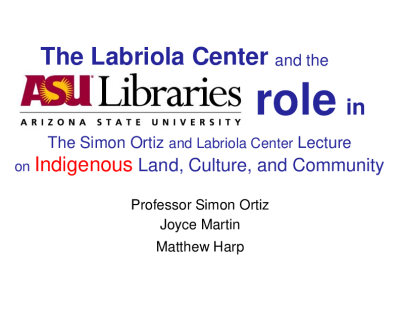Harp, Matthew
A collection of scholarly and professional work created by Matthew Harp. Matthew is a Research Data Management Librarian and Director of Research Data Services in ASU Library Technology Services. He has also served as a Liaison Librarian in the ASU Library Engagement and Learning Services STEM Division, as Digital Projects Librarian in Informatics and Cyberinfrastructure Services, and was the Digital Library Production Manager producing instructional and outreach media. orcid.org/0000-0001-6136-851X
Filtering by
- Creators: Arizona State University. ASU Library
- Creators: Ogborn, Matt
While PhD dissertations are typically accessible many other terminal degree projects remain invisible and inaccessible to a greater audience. Over the past year and a half, librarians at Arizona State University collaborated with faculty and departmental administrators across a variety of fields to develop and create institutional repository collections that highlight and authoritatively share this type of student scholarship with schools, researchers, and future employers. This poster will present the benefits, challenges, and considerations required to successfully implement and manage these collections of applied final projects or capstone projects. Specifically, issues/challenges related to metadata consistency, faculty buy-in, and developing an ingest process, as well as benefits related to increased visibility and improved educational and employment opportunities will be discussed. This interactive presentation will also discuss lessons learned from the presenter’s experiences in context of how they can easily apply to benefit their respective institutions.
This presentation highlights SHARE’s ongoing initiatives as a free, open data set about research and scholarly activities across their life cycle. It includes information about the SHARE open technology and the ongoing community contributions. A variety of data set use cases and their implementation will be described to allow others to apply similar tools and techniques to their home institution or organization. SHARE aggregates free, open metadata about scholarship that includes proposals, registrations, data, publications, and more from more than 125 sources including ASU.
You’ve probably heard a lot of “futurists” talk about data, but it’s not always clear how data relate to our day to day work in libraries.
Why are data important, and what’s the big deal? Data are not just spreadsheets and numbers, but come in many different shapes, colors, and flavors! In this presentation, we will give an introduction to data, talk about why it is relevant, and demonstrate how to and use data in practical situations. We will also provide innovative examples that will inspire you to connect with your colleagues and patrons!
Digital technology has enabled us to record and share our memories and histories faster and in greater numbers than previously imagined. However digital files rely on hardware, software, and descriptive information to be used. As formats change and equipment to read them goes out of use we are all challenged to connect our present to our future. How long do you want your digital files to last? Decades or even a few years from now will you still be able to access and enjoy those pictures, documents and other digital items you create today?
Libraries, museums and archives spend countless hours and resources preserving physical items from the past and present, but may be forfeiting the longevity of our digital work and connecting to future generations through unintended neglect. Using practical examples and employing best practices of research institutions, participants will learn important first steps to digital preservation including the importance of metadata to personal history, recommended file formats, and approaches they can immediately use to ensure the work they create today will still be enjoyed tomorrow. Help yourself, your organization, and your patrons continue to connect their digital heritage to the generations yet to come.


The Simon Ortiz and Labriola Center Lecture on Indigenous Land, Culture, and Community addresses topics and issues across disciplines in the arts, humanities, sciences, and politics. Underscoring Indigenous American experiences and perspectives, this Series seeks to create and celebrate knowledge that evolves from an Indigenous worldview that is inclusive and that is applicable to all walks of life.” Professor Simon Ortiz discussed the overall nature of the Series, especially emphasizing the global nature of Indigenous concerns. Joyce Martin and Matthew Harp elaborated on the contributions of the Labriola National American Indian Data Center and ASU Libraries to the Series.
The Labriola Center hosts an informal event in Hayden Library which facilitates close interaction between the featured speaker and audience members. The ASU Libraries records the evening lectures which take place at the Heard Museum and presents both an audio podcast and streaming video of each lecture on the ASU Library Channel webpage. This lecture series provides not only a chance for community discussion at the events themselves, but through the innovative use of technology the ASU Libraries enables additional forums for discussion in blogs and web pages which choose to link to the streaming videos.



Getting to the Core of Services: Considering the Arizona State University Library as a Core Facility

The substance of this article is based upon a lightning talk given at RDAP Summit 2019.
